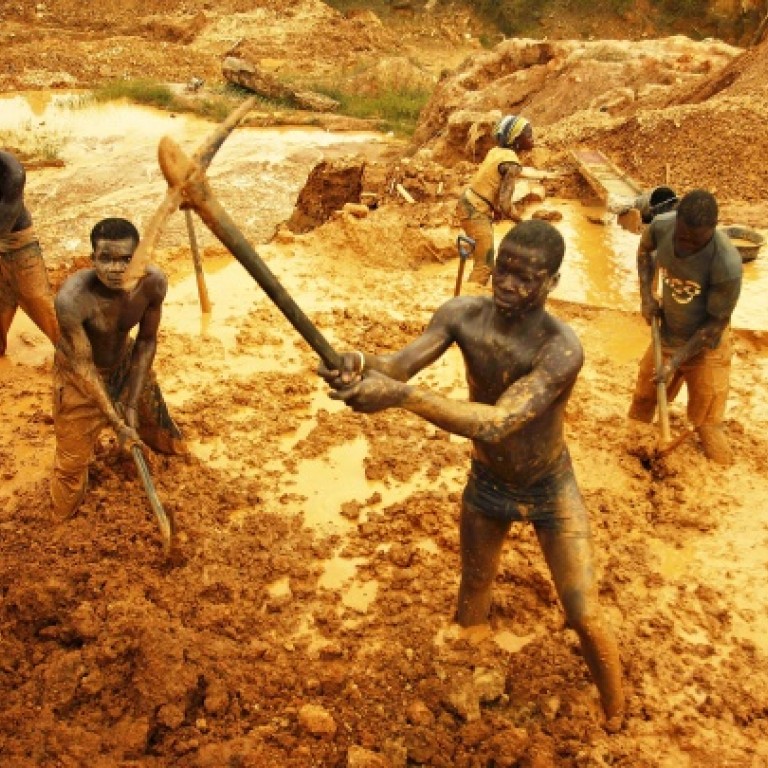
The Guangxi miners in Ghana gold rush
Chinese President Xi Jinping ended his six-day visit to Africa on a high note, leaving behind signed deals and warm pledges. The Republic of Congo was his final stop, after Tanzania and South Africa. He’s committed to a river port in Oyo, Congolese President Denis Sassou Nguesso's hometown, and a sea port in Pointe-Noire for exporting mineral ore.
Congo is already an established oil producer and China is already its biggest trading partner. Xi announced he wanted to raise ties with Congo "to a new and higher level".
"We expect to work together with our African friends to seize upon historic opportunities and deepen cooperation ... in order to bring greater benefit to the Chinese and African peoples,” he said in Brazzaville.
Fine words indeed. One place he did not go was Ghana, in West Africa, where he could have seen Chinese and African co-operation in action. This is the scene of the gold rush 2013 style, where about 50,000 migrants from Shanglin in southern Guangxi, have received welcomes a little less warm than Xi’s.
Natives of Shanglin, famous for producing and exporting gold miners, started heading to Ghana’s goldfields eight years ago. They were lured by a yarn that a Shangliner had rocked up there with Rmb5 million in his pocket, returning home 20 times richer three years later.
Ghana guesses its Shanglin goldminer population, legal and illegal, numbers about 50,000. The story has it, according to Week In China, that they have devised a type of sand pump that can maximise gold yields from alluvial exploration. The technique remains a jealously guarded secret, known only to the Shanglin miners, who stick together like glue.
The Chinese apparently got an in by working mines that are too small to attract the bigger companies, with equipment superior to the Ghanaian prospectors’. The Chinese work so hard that the locals apparently assumed that they were convicts serving hard labour sentences.
Luke-warm welcome
But Shanglin’s contribution to Ghana’s mining industry is not always well-received. “The involvement of the Chinese has changed the dynamic of small-scale mining,” Toni Aubynn, head of the Ghana Chamber of Mines, told Bloomberg. “They use bulldozers, pay loaders and really heavy machinery. The level of environmental devastation is huge.”
But the Chinese are too busy mining money to worry about that. In 2011, 30% of Ghana’s 3.6 million ounces of gold production came from small-scale mines, up from less than a quarter the year before, Aubynn said.
Mining on small plots under 25 acres is legally restricted to local Ghanaians. But the wily Chinese typically join forces and share spoils with the local chief, paying a flat rate of 10,000 cedis (about US$5,000) a month.
“The land belongs to the chiefs and they also have the mineral certificates, so we can say that this is the chief’s mine and we are just helping him to exploit it,” miner Tan Xinhua is reported as saying.
Cynics who saw the warmth of Xi’s African welcome might say that blind eyes are being turned, to avoid upsetting Beijing. According to WIC Ghana signed up for a $3 billion (HK$23.3 billion) loan with the China Development Bank two years ago.
And the Shanglin miners certainly earn their money. Locals are getting fed up with the environmental damage and the Chinese are often targeted by bandits.
Chinese official protested when a 16 year-old Chinese boy was killed during a police crackdown last year. Tan says they are often subject to immigration raids, and it’s a case of pay up or risk repatriation. But the rewards justify the risk. An average prospect produces 200-300 grammes of gold per day, providing daily income or about Rmb100,000. After operating costs, the annual take can be Rmb10 million, enough to finance a very comfortable life back in Shanglin.

